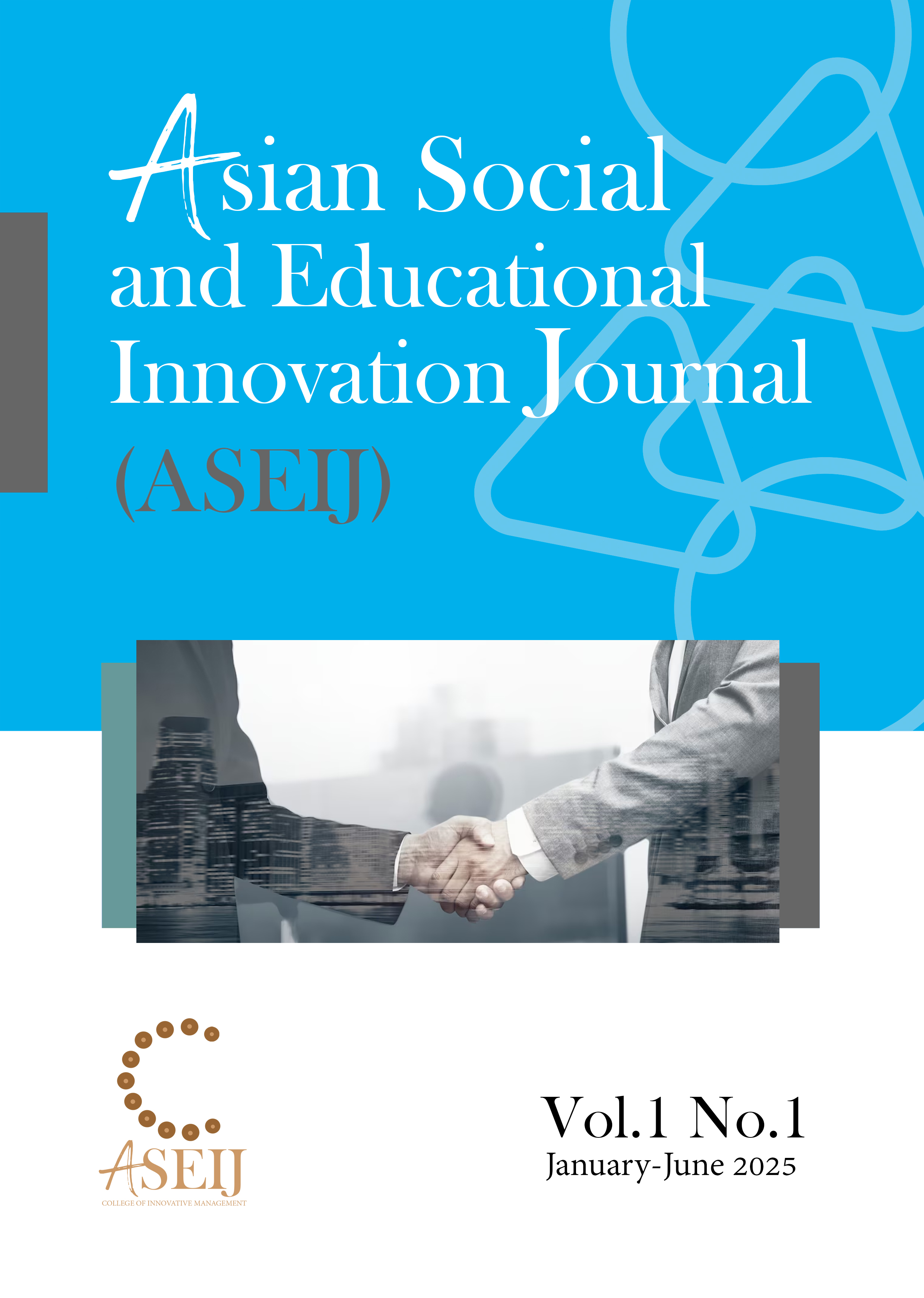Confirmatory factor analysis of technology organization and environment on artificial intelligence adoption for small and medium enterprises in the metropolitan area
Main Article Content
Abstract
This research aims to analyze the confirmatory factor analysis of technological, organizational, and environmental factors affecting the adoption of Artificial Intelligence (AI) in small and medium-sized enterprises (SMEs) within the Bangkok metropolitan area, utilizing the Technology-Organization-Environment (TOE) framework. The sample consisted of 320 SME entrepreneurs in the metropolitan area selected through purposive sampling. Data were collected using a questionnaire with an overall reliability coefficient (Cronbach's alpha) of 0.86 and analyzed through Confirmatory Factor Analysis using Jamovi software. The findings revealed that the majority of respondents were female (51.2%) working in the manufacturing sector (25.6%) holding bachelor's degrees (48.6%) and aged 31-35 years (66.3%). In the technological factor dimension the observed variable "complexity" exhibited the highest factor loading. For organizational factors “organizational support” demonstrated the highest factor loading. Regarding environmental factors “government support” showed the highest factor loading. For AI adoption the variables “implementing AI to improve company performance” and “utilizing AI to enhance organizational efficiency” had the highest factor loadings. The study demonstrates that AI adoption in SMEs requires integration of all three-dimensional factors, particularly reducing technological complexity, building internal organizational support, and securing government backing to achieve performance improvements and sustainable competitive advantages. These findings provide valuable insights for policymakers and SME managers seeking to facilitate successful AI implementation in metropolitan business environments
Article Details

This work is licensed under a Creative Commons Attribution-NonCommercial-NoDerivatives 4.0 International License.
References
Digital Economy Promotion Agency, Artificial intelligence landscape in Thailand: Opportunities and challenges. DEPA Publications, 2024.
McKinsey & Company, The age of AI: Artificial intelligence and the future of work. McKinsey Global Institute, 2018.
Massachusetts Institute of Technology, Artificial intelligence and global GDP impact: Economic pro-jections for 2030. MIT Press, 2025.
International Data Corporation, Global AI market forecast and economic impact analysis. IDC Re-search, 2024.
Innoharma Education, Future of work: AI impact on global employment trends. Innoharma Publica-tions, 2025.
Thai Rath, Singapore leads ASEAN in AI economic contribution. Thai Rath Business Daily, 2024. February 8: p. 18.
Electronic Transactions Development Agency, Digital competency enhancement programs for SMEs in metropolitan areas. ETDA Publications, 2023.
Post Today, AI contribution to ASEAN economic growth. Post Today Business Section, 2024. March 15: p. B12.
Thai Bankers Association, Digital banking and AI adoption challenges among Thai SMEs. TBA Re-search Department, 2024.
SCB Economic Intelligence Center, Digital ecosystem development for SME sustainability. Siam Commercial Bank Publications, 2024.
Office of Small and Medium Enterprises Promotion, SME white paper 2024: Statistical profile of Thai SMEs. SME Development Bank Publications, 2024.
Kerdsawat, W., Thanakit, S. and P. Lertwongsatien, Three-dimensional integration framework for AI utilization in metropolitan SMEs. Journal of Business and Technology, 2024. 15(2): p. 112–128.
SME Thailand Club, AI applications in Thai small and medium enterprises: Current trends and future prospects. SME Club Publications, 2024.
Hussain, A. and M. Rizwan, Structured approach to AI implementation in SMEs: Building awareness and technical expertise. Journal of Small Business Management, 2024. 62(3): p. 245–268.
Lexalytics, AI adoption and economic growth correlation study: Global analysis. Lexalytics Research Division, 2024.
Organizational culture as a determinant of AI readiness in Bangkok SMEs: Risk-taking and innovation perspectives. International Journal of Innovation Management, 2024. 28(3): p. 245–267.
Jawapatarakul, D., Thanakit, S. and C. Lertwongsatien, Organizational culture and AI adoption in Thai SMEs: The role of innovation and learning orientation. Asian Journal of Technology Innovation, 2024. 32(2): p. 189–205.
Luo, X., Tong, S., Fang, Z. and Z. Qu, Frontiers in service science: Environmental factors driving digital transformation and AI adoption in SMEs. Journal of Service Research, 2022. 25(4): p. 512–529.
Thanyawatpornkul, R., Environmental factors and AI adoption for sustainable business practices in Thailand. Sustainability, 2024. 16(8): p. 3245.
Mueller, R.O. and G.R. Hancock, Factor analysis and latent structure: Confirmatory factor analysis. In: Smelser, N.J. and P.B. Baltes (Eds.), International Encyclopedia of the Social and Behavioral Sciences. Pergamon, 2001. p. 5239–5244.
Jongwanich, J. and A. Kohpaiboon, Technological complexity and artificial intelligence adoption in Thai manufacturing SMEs. Technology Analysis & Strategic Management, 2025. 37(1): p. 78–95.
Badghish, S. and Y.A. Soomro, Technology-Organization-Environment framework and artificial intelli-gence adoption in Saudi Arabian SMEs: Performance implications. Technology in Society, 2024. 78: p. 102–115.
Faruque, M.O., Sarker, M.R. and M.S. Rahman, Digital transformation in small and medium enter-prises: Challenges and opportunities in emerging economies. International Journal of Information Management, 2024. 75: p. 102–118.


